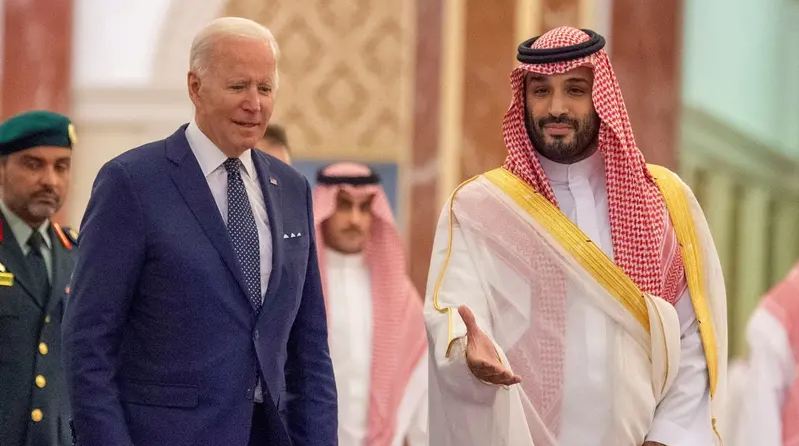Despite the latest Iran deal endorsed by China, US-Saudi relations are strengthening
While still acknowledging the challenging time their bilateral ties are going through, US and Saudi officials now anticipate a more promising future.
Since the two countries formalised connections more than 70 years ago, the relationship between the US and Saudi Arabia has clearly gone through one of its most difficult eras.
However, officials and recent statements from the Biden administration suggest that the tide may be gradually shifting in favour of a more stable atmosphere between Washington and Riyadh, notwithstanding the recent China-backed agreement between Saudi Arabia and Iran to resume relations.
A State Department spokeswoman told Al Arabiya English, “Looking ahead, we are focused on ensuring that our engagement with Saudi Arabia continues to serve the interests of the American people, and we have seen and continue to see great strategic value in this relationship”.
There have been other rocky times, such as the oil embargo in the 1970s, the 2003 US invasion of Iraq, the Obama administration’s attitude towards Iran, and the nuclear deal that followed in 2015.
Relationships improved throughout the Trump administration, and the former US president travelled to Saudi Arabia for the first time. After Donald Trump delayed launching a military strike in response to Iran’s strikes on Saudi oil refineries in 2019, that newly established trust was put to the test.
And while running for office, Joe Biden promised to “make Saudi Arabia a pariah”. Shortly after Biden took office, a number of foreign policy measures that targeted Saudi Arabia and other Gulf states were made, including the suspension of military deliveries to Riyadh.
However, recent developments have been particularly concerning and have put US-Saudi relations at risk.
The Biden administration saw the Saudi-led OPEC+’s move to reduce oil supply prior to the US midterm elections as a political gimmick designed to harm Democrats’ prospects of defeating Republicans. These allegations have been vigorously refuted by Saudi Arabia, which also noted that the oil price stabilised soon following the decision to reduce production.
When Saudi Arabia made its move at a time when the US and Europe were attempting to strain Vladimir Putin’s coffers in the midst of his war on Ukraine, Washington accused Saudi Arabia of collaborating with Russia.
The White House and other US government representatives promised to reevaluate the relationship with Saudi Arabia, even threatening to impose financial and economic sanctions.
But soon after, US government representatives’ attitudes towards Saudi Arabia changed.
Saudi Arabia joined a number of Arab and Gulf nations in voting at the UN to denounce the Russian invasion of Ukraine and demand that Moscow withdraw its military from the neighbouring nation. Saudi Arabia then promised Kyiv $400 million as compensation. The Biden administration soon reduced its criticism of the Gulf state and praised it for its good achievements.
Senior US officials attended security meetings in Riyadh a week earlier to discuss Iran and other common dangers, debunking suggestions that Washington was attempting to distance itself from the area.
Additionally, the White House and State Department officials praised the China-backed agreement when the unexpected announcement of rapprochement between Riyadh and Tehran was made.
US officials have made statements regarding the Yemen war over the previous ten days that were perceived as favourable towards Saudi Arabia while denouncing the Houthis, who are supported by Iran.
With Biden remarking, “It’s not going to be as bad as you think”, the US response to the recent Saudi and OPEC+ plans to significantly reduce oil production next month was also much more subdued.
While still acknowledging the challenging time their bilateral ties are going through, US and Saudi officials now anticipate a more promising future.
According to a prior US source who spoke to Al Arabiya English, CIA Director Bill Burns visited Saudi Arabia this week to reaffirm the US commitment to intelligence collaboration, particularly in fields like counterterrorism.
There have been attempts to engage constructively, according to Karen Young, a senior research scholar at Columbia University’s Center on Global Energy Policy. These initiatives were started by the US government and led by the Saudis.
The first collaborative counter-drone drill between the US and Saudi Arabia was completed last month at a brand-new military testing facility in Riyadh. Furthermore, Saudi Arabia recently agreed to “landmark deals” with Boeing for more than 120 aircraft totaling $37 billion, according to the US. The White House said that 44 states and more than one million American jobs may be supported by the pact.
According to sources with knowledge of the negotiations, the signing of the agreement was postponed in October as a result of the Biden administration’s allegations that Saudi Arabia was siding with Russia.
One official stated, “The Boeing deal is a testament to the fact that relations are beginning to improve”. “There has been progress, but this is still very much a work in progress”.
According to a representative of the National Security Council, the United States is interested in cooperative efforts in the areas of Yemen, Ukraine, and the Boeing agreement. These initiatives “generally enjoy broad bipartisan support in Congress”, the source added, and “we hope and expect to make further progress over the coming period”.
The NSC official added that through “O-Ran technologies,” the US and Saudi Arabia were collaborating to develop 5G and 6G networks that were “more trusted and secure.”
As part of ongoing negotiations, Saudi Arabia has asked the US for technology to enrich the uranium it already has in order to make and then sell fuel. This could result in an impending test. Otherwise, according to Saudi authorities, they may turn to China, Russia, or France for assistance.
The spokesperson for the State Department stated that the Biden administration was dedicated to helping Saudi Arabia’s clean energy transition, including its attempts to create a peaceful nuclear energy program, but she refrained from indicating that the US had given its blessing to Saudi Arabia’s ambitions to enrich uranium.
“Due to their potential technical relevance to the creation of fissile materials, the United States has long sought to restrict the global spread of uranium enrichment and spent fuel reprocessing technology. The government is still dedicated to this long-standing US nonproliferation goal, as President Biden has made clear, the official added.
The official did, however, commend Saudi Arabia for being a strategic ally of the US for eight decades and noted that there was “clearly important work ahead” with Riyadh, particularly on the Ukraine, Yemen, threats from Iran, climate change, and 5G and 6G networks.
Young told Al Arabiya English, “There is still a lot of goodwill left, but the US will have to accept a Saudi Arabia that is fundamentally different from the past, and that has been one of the barriers to understanding.
Extracted from Al Arabiya.



